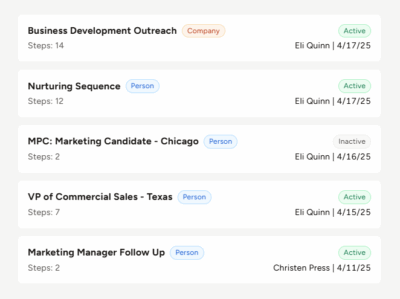In the wide, wild world of recruitment, where talent acquisition meets client relationship management, the significance of robust CRM systems cannot be overstated. These systems serve as the lifeblood of recruitment agencies, acting as the cornerstone for managing candidate pipelines, nurturing client relationships, and driving organizational growth. However, the journey towards excellence is often fraught with CRM challenges that demand careful navigation and strategic foresight.
In this blog post, we shall embark upon a voyage through the landscape of CRM in recruitment, explore the common hurdles encountered during implementation, and unveil actionable strategies for embracing CRM excellence.
CRM’s Crucial Role in Recruitment
Before delving into the intricacies of CRM challenges and solutions, it’s imperative to elucidate the pivotal role CRM systems play in the recruitment ecosystem. At its essence, a CRM system serves as a centralized repository for managing candidate and client interactions, facilitating seamless communication, and providing invaluable insights to recruiters and consultants. Let’s explore the multifaceted functions of CRM in recruitment:
1. Candidate Management
In the intricate dance of talent acquisition, managing candidate pipelines with precision is paramount. Recruitment CRM systems empower recruiters to maintain comprehensive candidate profiles, track interactions, and evaluate candidate suitability for diverse roles. By harnessing the power of CRM, recruiters can streamline the recruitment process, enhance candidate engagement, and deliver personalized experiences that resonate with top talent.
2. Client Relationship Management
At the heart of every successful recruitment agency lies a robust client management strategy. CRM platforms serve as the conduit for nurturing client relationships, facilitating communication, and aligning services with client expectations. Through CRM, recruiters can track client preferences, anticipate needs, and cultivate long-lasting partnerships built on trust and mutual respect.
3. Workflow Optimization
In a realm where time is of the essence, optimizing workflows is imperative for staying ahead of the curve. Recruiting CRM systems automate repetitive tasks, such as scheduling interviews, sending follow-up emails, and generating reports, thereby freeing up recruiters’ time to focus on strategic initiatives. By streamlining processes and minimizing administrative overhead, CRM enhances productivity, accelerates time-to-fill, and drives operational efficiency.
4. Analytics and Reporting
In the data-driven landscape of recruitment, insights reign supreme. CRM platforms offer robust analytics and reporting capabilities, enabling recruiters to glean actionable insights from vast troves of data. By tracking key performance indicators, such as candidate conversion rates, client satisfaction scores, and revenue attribution, recruiters can refine strategies, optimize processes, and drive continuous improvement.
Common CRM Challenges in Implementation
While the promise of CRM systems is tantalizing, the path to implementation is riddled with obstacles that can derail even the most well-intentioned efforts. From technical complexities to organizational inertia, recruitment agencies face a myriad of challenges on their journey towards CRM excellence. Let’s delve into some of the most common hurdles encountered during CRM implementation:
1. Data Migration and Integration
The prospect of migrating vast swathes of data from disparate sources into a new recruiter CRM system can be daunting. Recruitment agencies often grapple with the intricacies of data cleansing, mapping, and integration, fearing data loss or inconsistency in the process.
Solution: Prioritize meticulous planning and preparation before embarking on the data migration journey. Conduct a comprehensive audit of existing data sources, identify redundancies, and establish data cleansing protocols to ensure accuracy and consistency. Collaborate with IT experts or CRM consultants to streamline the integration process and mitigate potential disruptions. Additionally, invest in CRM solutions that offer robust integration capabilities with existing systems, minimizing manual data entry and enhancing efficiency.
2. User Adoption and Training
Resistance to change and inadequate training can stifle CRM adoption efforts, rendering even the most sophisticated systems ineffectual. Recruiting teams may be entrenched in existing workflows, wary of embracing new technologies, and skeptical of the perceived benefits of CRM adoption.
Solution: Cultivate a culture of continuous learning and innovation within the organization. Provide comprehensive training sessions tailored to different user groups, highlighting the relevance and benefits of CRM adoption for their specific roles. Foster open communication channels, encourage feedback, and address user concerns promptly to foster buy-in and enthusiasm for CRM adoption. Emphasize the tangible benefits of CRM, such as enhanced productivity, improved collaboration, and streamlined workflows, to garner support from skeptics and detractors.
3. Customization and Configuration
Every recruitment agency operates with its unique set of processes, workflows, and requirements. Off-the-shelf CRM solutions may lack the flexibility and customization options necessary to align with the agency’s specific needs, resulting in inefficiencies and frustration.
Solution: Prioritize customization and configuration during the CRM implementation process to tailor the system to the agency’s workflows and preferences. Leverage modular CRM platforms that offer flexibility and scalability, allowing for easy customization without extensive coding or development efforts. Collaborate with CRM vendors or developers to design bespoke solutions that address the agency’s unique challenges and requirements. Conduct thorough stakeholder interviews and workshops to identify pain points, gather requirements, and design a CRM solution that seamlessly integrates into existing workflows and processes.
4. Data Security and Compliance
In an era of heightened data privacy regulations and cybersecurity threats, safeguarding sensitive candidate and client information is paramount. Recruitment agencies must navigate a labyrinth of regulatory requirements, including GDPR, HIPAA, and CCPA, while ensuring the integrity and confidentiality of data stored within CRM systems.
Solution: Implement robust data security measures, including encryption, access controls, and regular audits, to protect sensitive information from unauthorized access or breaches. Partner with trusted CRM vendors that prioritize data security and compliance, providing assurances of regulatory adherence and adherence to industry best practices. Educate staff on data privacy protocols, conduct regular training sessions, and enforce strict access controls to mitigate security risks and foster a culture of compliance within the organization.
5. Performance and Scalability
As recruitment agencies scale their operations and expand their client base, the limitations of legacy CRM systems may become apparent. Performance bottlenecks, system downtime, and resource constraints can impede productivity, hamper growth, and erode client trust.
Solution: Invest in scalable CRM solutions that can accommodate the agency’s current needs while anticipating future growth and expansion. Conduct regular performance assessments and system audits to identify bottlenecks, optimize system configurations, and enhance efficiency. Leverage cloud-based CRM platforms for increased scalability and flexibility, enabling seamless access to resources and functionalities as the agency grows. Collaborate with IT experts or CRM consultants to design a robust infrastructure that can withstand the demands of a dynamic and evolving recruitment landscape.
Embracing CRM Excellence
In the face of daunting challenges, the quest for CRM excellence demands unwavering commitment, strategic vision, and relentless pursuit of innovation.
Executive recruiters and search consultants must embrace CRM as more than just a tool but as a catalyst for organizational transformation and competitive differentiation. Let’s explore actionable strategies for embracing CRM excellence and charting a course for success:
1. Executive Sponsorship and Leadership
Secure buy-in from senior leadership to champion CRM adoption and allocate resources for implementation and training initiatives. Executive sponsorship provides the necessary impetus and credibility to drive organizational change, fostering a culture of innovation and continuous improvement.
2. Cross-Functional Collaboration and Alignment
Break down silos and foster collaboration between recruitment, sales, marketing, and IT teams to ensure alignment of goals and processes. Encourage knowledge sharing, cross-training, and interdisciplinary collaboration to harness the collective expertise of diverse teams and drive synergies across the organization.
3. User-Centric Design and Training
Prioritize user-centric design principles and invest in comprehensive training programs to empower users with the skills and knowledge necessary for CRM success. Tailor training sessions to different user groups, emphasizing hands-on learning, practical applications, and real-world scenarios to maximize engagement and retention.
4. Continuous Improvement and Innovation
Embrace a culture of continuous improvement by soliciting feedback from users, monitoring key performance indicators, and iteratively refining CRM workflows and processes. Leverage user feedback, industry best practices, and emerging technologies to drive innovation and stay ahead of the curve in a rapidly evolving recruitment landscape.
5. Strategic Partnerships and Technology Integration
Forge strategic partnerships with CRM vendors, consultants, and technology partners to harness the full potential of CRM systems. Explore opportunities to integrate emerging technologies, such as artificial intelligence, machine learning, and predictive analytics, into existing CRM ecosystems to drive competitive advantage and differentiation.
CRM Challenges: Setting Sail Towards Excellence
The journey towards CRM excellence in recruitment is fraught with challenges, yet brimming with opportunities for innovation and growth. By understanding the landscape of CRM in recruitment, identifying common implementation challenges, and embracing actionable strategies for success, executive recruiters and search consultants can navigate the complexities of CRM adoption with confidence and conviction.
As stewards of talent acquisition and client engagement, executive recruiters and search consultants play a pivotal role in driving CRM excellence within their organizations. By prioritizing user adoption, customization, data security, and scalability, recruitment agencies can unlock the full potential of CRM systems to drive business growth, foster client satisfaction, and propel organizational success in an increasingly competitive and dynamic marketplace.
In an era of unprecedented digital transformation and disruption, the quest for CRM excellence is not merely a destination but a continuous journey of discovery, innovation, and evolution. By embracing CRM as a strategic imperative and rallying the collective efforts of teams towards a common vision, executive recruiters and search consultants can chart a course for success, setting sail towards a future defined by excellence, resilience, and unparalleled achievement in the realm of recruitment.









